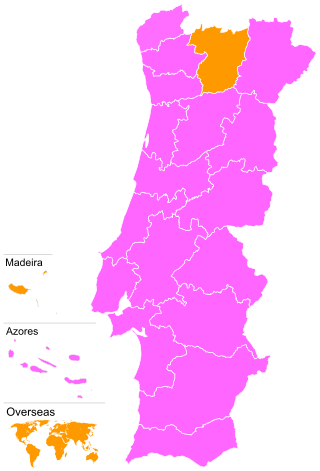Top Qs
Timeline
Chat
Perspective
2019 European Parliament election in Portugal
From Wikipedia, the free encyclopedia
Remove ads
An election was held in Portugal on Sunday, 26 May 2019, to elect the Portuguese delegation to the European Parliament from 2019 to 2024. This was the eighth European Parliament election held in Portugal.
The Socialist Party (PS) was the winner of the election, scoring 33.4 percent of the vote. The party increased their share of the votes by 2 percentage points from the 2014 election, and won an additional seat. It was one of the only three times in Portuguese history where the government party won a European election.
The Social Democratic Party (PSD) achieved its worst results ever as a standalone party, with 21.9 percent of the vote, distancing more than eleven points from the winner. The People's Party (CDS), which ran alongside the PSD in the previous election, as part of the Portugal Alliance, also fell below expectations at 6.2 percent of the vote, only being able to elect their top candidate Nuno Melo.
The Democratic Unity Coalition (CDU) scored their worst result as well, narrowly electing two European Parliament members compared with their former three. On the other hand, the Left Bloc (BE) rebounded to previous support levels, more than doubling its vote share to 9.8 percent and electing a new member.
The big surprise of the elections was the result of People-Animals-Nature (PAN). Headed by civil engineer André Silva, PAN won 5.1 percent of the votes and was able to elect its first ever European Parliament member, over-performing the polls.
Turnout, again, fell to the lowest level ever, with only 30.7 percent of voters casting a ballot. Abstention reached an unprecedented level of 99.04 percent for Portuguese citizens living abroad.[1]
Remove ads
Electoral system
The voting method used, for the election of European members of parliament, is by proportional representation using the D'Hondt method. For the 2019 European Union elections, Portugal had 21 seats to fill. Deputies are elected in a single constituency, corresponding to the entire national territory.
This election was also the first in which the changes to the electoral law approved in 2018 were put into practice. The main changes were the automatic registration of all Portuguese citizens, at home and abroad, above 17 year's old, prompting the number of registered voters to increase from 9.7 million to almost 10.8 million, the introduction of early voting to all voters without filling an excuse, in previous elections voters could only vote early if they were unable to attend a polling station on election day, and the end of the "voting card", as voters would only need their identification card to cast a ballot.[2] To vote early, 19,584 voters, 0.2 percent of all registered voters, requested an early ballot. According to the government, 14,909 voters cast an early ballot.[3]
Remove ads
Parties and candidates
The major parties that participated in the election and their European Parliament list leaders, ranked by percentage of the vote received, were:
- Socialist Party (PS), Pedro Marques[4]
- Social Democratic Party (PSD), Paulo Rangel[5]
- Left Bloc (BE), Marisa Matias[6]
- Democratic Unity Coalition (CDU), João Ferreira[7]
- People's Party (CDS), Nuno Melo[8]
- People–Animals–Nature (PAN), Francisco Guerreiro[9]
- Alliance (A), Paulo Sande[10]
- LIVRE (L), Rui Tavares[11]
- Basta (B), André Ventura[12]
- We, the Citizens! (NC), Paulo de Morais[13]
- Liberal Initiative (IL), Ricardo Arroja[14]
- Portuguese Workers' Communist Party (PCTP/MRPP), Luís Júdice[15]
- National Renovator Party (PNR), João Patrocínio[16]
- Democratic Republican Party (PDR), António Marinho e Pinto[17]
- United Party of Retirees and Pensioners (PURP), Fernando Loureiro[18]
- Portuguese Labour Party (PTP), Gonçalo Madaleno[19]
- Socialist Alternative Movement (MAS), Vasco Santos[20]
Remove ads
Campaign period
Party slogans
Candidates' debates
With parties represented in the European Parliament
With parties not represented in the European Parliament
Remove ads
Opinion polls
Summarize
Perspective
Exit poll
Remove ads
Voter turnout
The table below shows voter turnout throughout election day including voters from Overseas.
Results
Distribution by European group
Maps
- Most voted political force by municipality.
Electorate
Remove ads
See also
Notes
- The Social Democratic Party (PSD) and the People's Party (CDS–PP) contested the 2014 election in a coalition called Portugal Alliance (AP) and won a combined 27.7% of the vote and elected 7 MP's to the European parliament.
- PDR main candidate, António Marinho e Pinto, was a MEP elected in 2014 and he refused to attend the debate with the minor parties with no representation in the European Parliament.
- Results presented here exclude undecideds (5.3%). With their inclusion results are: PS: 34.1%; PSD: 24.8%; BE: 9.2%; CDU: 8.3%; PP: 8.1%; A: 1.8%; PAN: 1.4%; Others: 7.0%.
- Results presented here exclude undecideds (15.4%). With their inclusion results are: PS: 32.6%; PSD: 19.8%; CDU: 11.3%; PP: 8.4%; BE: 6.3%; PAN: 2.0%; A: 1.2%; Others: 3.0%.
- The main candidate for the Earth Party (MPT) in 2014, António Marinho e Pinto, left MPT in late 2014 and formed his own party, the Democratic Republican Party (PDR).
- Includes the 7.2%, and 2 seats, won by MPT in the 2014 EP elections. MPT dropped out from the 2019 EP elections due to internal infighting.
- Compared with the combined total of 0.91% of PPM and PPV/CDC in the 2014 EP elections.
Remove ads
References
External links
Wikiwand - on
Seamless Wikipedia browsing. On steroids.
Remove ads









